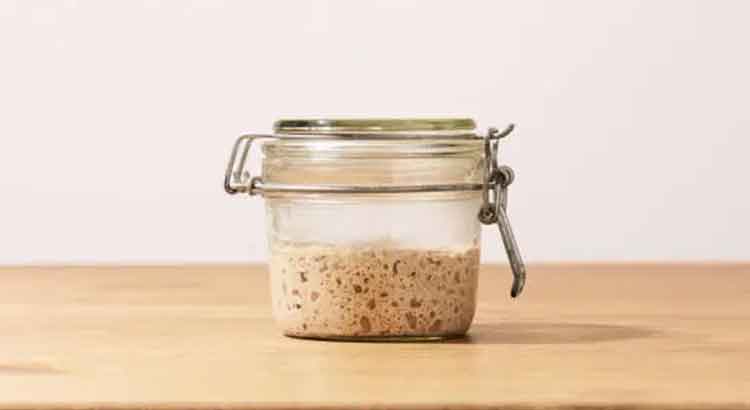Do you ever find yourself debating between using a sourdough starter or levain in your bread-making adventures? Are your loaves not turning out quite as you hoped? Let’s unravel the mystery of these two doughy companions and discover how they can elevate your baking game.
The main difference between sourdough starter and levain is their hydration level. Sourdough starter is typically a mixture of equal parts flour and water, creating a runny consistency. Levain, on the other hand, is a stiffer mixture with a higher proportion of flour, offering more structure to your bread.
While both can be used to leaven your dough and infuse it with that delightful tangy flavor, understanding their nuances can help you bake bread that’s as good as your favorite bakery’s. So, let’s delve deeper into the similarities and differences between these two essential ingredients for your artisanal bread-making journey.
Sourdough Starter vs. Levain: The Hydration Dilemma
Sourdough starter and levain are like two cousins in the world of bread-making, often confused but with distinct characteristics. The key difference lies in their hydration level, and this plays a pivotal role in the outcome of your bread.
Sourdough starters are typically a slurry of equal parts flour and water. The 1:1 ratio creates a watery mixture that’s easy to work with and contributes to a lighter crumb in your final bread. It’s like the carefree, adventurous cousin who goes with the flow, imparting a mild sour flavor to your dough.
On the other hand, levain is a stiffer, more structured blend with a higher proportion of flour. This gives it a firmer texture, akin to a determined family member who sticks to their principles. Levain’s denser composition results in a more pronounced tangy flavor and a chewier crumb in your bread.
The Fermentation Factor
Both sourdough starter and levain rely on the power of fermentation to create bubbles, leaven the dough, and infuse that sought-after sour taste. However, their hydration levels affect this process differently.
Sourdough starter, with its higher water content, ferments more rapidly. This cousin is like the life of the party, bubbling up and producing gas quicker. It’s a good choice when you need your dough to rise swiftly and achieve an open, airy texture.
Levain, with its thicker consistency, ferments more slowly and steadily. It’s the patient cousin, taking its time to develop complex flavors during fermentation. This makes it ideal for recipes where you want a deep, rich taste to complement your bread.
Mixing and Incorporating
When it comes to mixing sourdough starter or levain into your bread dough, they each bring their unique challenges.
Sourdough starter disperses easily into your dough, blending seamlessly. Its watery nature makes it a flexible addition to various recipes, ensuring even distribution of the sourdough culture throughout the dough.
Levain, being firmer, requires a bit more effort to mix evenly. It’s like that stubborn cousin who needs a little extra coaxing to join the family gathering. Incorporating levain thoroughly can be a workout for your dough, but it’s worth it for the distinct flavor and texture it imparts.
The Common Ground: Shared Traits
Now that we’ve explored the differences between sourdough starter and levain, let’s turn our attention to the commonalities that bind these bread-making cousins together.
1. Wild Yeast and Lactic Acid Bacteria
Both sourdough starter and levain rely on the same dynamic duo: wild yeast and lactic acid bacteria. These microscopic superheroes work in tandem to ferment the dough, producing carbon dioxide gas that makes your bread rise. This shared microbial partnership gives your bread that distinct tangy flavor and chewy texture, regardless of whether you opt for a starter or levain.
2. Time-Tested Fermentation
Both cousins require time to ferment properly. Whether it’s your laid-back sourdough starter or the patient levain, they need a cozy period of fermentation to work their magic. This shared characteristic means you’ll need to plan ahead for your baking endeavors, allowing for the development of flavor and structure in your bread.
3. Flavor Enrichment
Sourdough starter and levain share the primary mission of enhancing the flavor of your bread. While their hydration levels and fermentation rates differ, they both contribute to that distinctive sourdough taste that enthusiasts adore. Whether you prefer a milder hint of tang or a more robust, in-your-face sourness, both cousins can help you achieve the desired flavor profile.
4. Versatility
Despite their differences, sourdough starter and levain are versatile additions to your baking toolkit. You can adapt and customize your recipes to accommodate either, depending on your baking goals. This versatility ensures that you can experiment with different bread styles, from rustic boules to tender baguettes, while harnessing the unique characteristics of each cousin.
5. Health Benefits
Both sourdough starter and levain offer potential health benefits. The extended fermentation process they undergo breaks down gluten and phytic acid, making bread more digestible for some individuals. Additionally, the presence of probiotic bacteria in sourdough can contribute to a healthier gut, although the benefits can vary from person to person.
Final Thoughts
In the realm of sourdough baking, the choice between a sourdough starter and levain ultimately boils down to personal preferences and the specific outcome you desire for your bread. It’s not a matter of one being superior to the other but rather about finding the right tool for the job, much like selecting the perfect ingredient for a recipe.
For those seeking convenience and a milder sour flavor, the sourdough starter is your go-to cousin. Its easygoing nature, quick fermentation, and ability to blend seamlessly into various doughs make it an excellent choice for beginners and busy bakers alike. You can whip up a starter in no time and have it ready to enhance your bread-making adventures.
On the other hand, levain, with its firm structure and patient fermentation, offers a more pronounced tangy taste and chewier crumb. If you’re a sourdough connoisseur looking for a deeper flavor profile and don’t mind investing a bit more time and effort, levain might be your preferred companion. It’s like having a reliable friend who brings out the best in your artisanal loaves.
In the end, whether you opt for the lively spirit of sourdough starter or the steadfastness of levain, both cousins have their place in the heart of every bread enthusiast. The key is to experiment, explore, and find the balance that suits your baking style and satisfies your taste buds. So, roll up your sleeves, get your flour ready, and let the magic of sourdough – in all its forms – elevate your bread-making journey to new heights.
Frequently Asked Questions
Q: Can I use sourdough starter and levain interchangeably in recipes?
A: Yes, you can often use them interchangeably, but it’s essential to consider the hydration level and fermentation time. If a recipe calls for one, and you want to use the other, you’ll need to make adjustments. For instance, if a recipe uses a sourdough starter and you prefer to use levain, you might need to reduce the water content in your dough to compensate for the levain’s lower hydration. Conversely, if a recipe calls for levain and you want to use a starter, you might need to adjust the recipe’s hydration by adding more water. Remember, it might take some trial and error to get the perfect substitution.
Q: Which one is better for beginners – sourdough starter or levain?
A: Sourdough starter is typically more beginner-friendly due to its simplicity and forgiving nature. It’s relatively easy to create and maintain, making it an excellent choice for those new to sourdough baking. Levain, with its stiffer consistency and longer fermentation times, can be a bit more challenging for beginners. However, once you’ve gained some experience with sourdough, experimenting with levain can be a rewarding next step.
Q: Can I convert my sourdough starter into levain and vice versa?
A: Yes, you can convert a sourdough starter into levain and vice versa, but it requires some adjustments. To convert a sourdough starter into levain, gradually increase the flour-to-water ratio in your starter over several feedings until it reaches the desired consistency of levain. For the reverse conversion, reduce the flour-to-water ratio in your levain until it resembles a starter. Keep in mind that these conversions may take several feedings and some patience, so plan accordingly.
Q: How do I store sourdough starter and levain when not in use?
A: Both sourdough starter and levain can be stored in the refrigerator when not in use. To store them, feed your starter or levain as usual, then place it in an airtight container and refrigerate. Cold temperatures slow down fermentation, allowing you to extend the time between feedings. Remember to feed your starter or levain regularly, even when refrigerated, to keep it healthy and active. If you need a break from baking, you can also freeze a portion of your starter or levain for longer-term storage, but be sure to thaw and refresh it before using.
Q: Can I use store-bought sourdough starter and levain instead of making my own?
A: Yes, you can use store-bought sourdough starter or levain if you prefer a shortcut. Many specialty stores and online retailers offer quality sourdough starters and levains. Using a store-bought version can save you time and effort in creating your own from scratch. However, be sure to follow the instructions provided with the purchased starter or levain, as their characteristics and hydration levels may differ from homemade versions. Additionally, some bakers prefer the flavor and control they get from cultivating their starter or levain.
Q: Are there any recipes specifically designed for sourdough starter or levain?
A: Yes, many recipes are tailored to either sourdough starter or levain, taking into account their unique characteristics. For example, sourdough starter may be used in recipes for quicker breads like pizza dough, while levain is often featured in longer-fermentation recipes like rustic sourdough loaves. When searching for recipes, consider the type of sourdough you want to make and choose recipes that align with your preferred starter or levain. Experimentation is part of the fun of sourdough baking, so don’t be afraid to try different recipes and adapt them to suit your chosen ingredient.
In the world of sourdough baking, these FAQs can be your compass, helping you navigate the intricate journey of sourdough starter and levain. Whether you’re a novice or an experienced baker, understanding how to work with these essential elements will empower you to create delectable homemade bread that suits your taste and preferences. So, roll up your sleeves, embrace the questions, and let the magic of sourdough transform your baking adventures.

